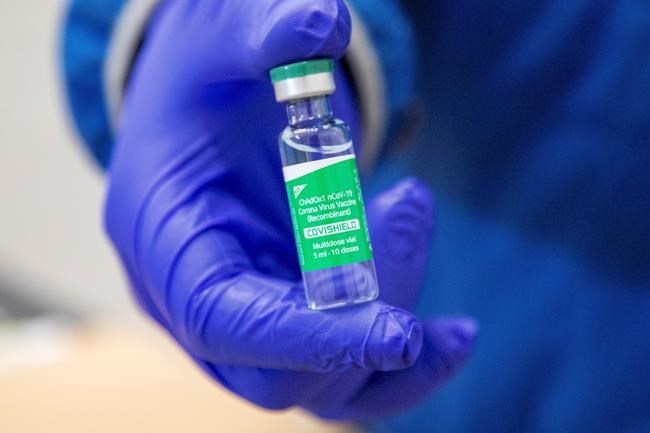Ontario blamed a vaccine shortage in some areas on a delayed shipment Wednesday as Ottawa pledged to keep pumping out Oxford-AstraZeneca shots following a safety review that found the product's benefits far outweigh its rare risks.
Some immunization clinics in Ontario were forced to close their doors or cancel appointments due to what Premier Doug Ford said was a thrice-delayed shipment of the Moderna shot.
"We were expecting the shipments to come in, but unfortunately we never ended up getting them," Ford said. "You can't plan properly if you don't know the flow of the product coming in through your production lines."
The Scarborough Health Network in Toronto closed two immunization clinics, which had been vaccinating area residents over the age of 50, all Indigenous adults and health-care workers. It said it plans to reopen the clinics when a new shipment of vaccines arrives Monday.
Toronto's University Health Network, meanwhile, said it paused registration for appointments for residents over age 18 who qualify for vaccination based on certain hot-spot postal codes, noting that more than 21,000 people had signed up for a shot.
Two other Toronto hospitals – North York General and Michael Garron Hospital – said they were also temporarily closing clinics because of supply issues.
Ontario has received a total of 4,506,495 doses of COVID-19 vaccine so far, and administered 3,310,157 doses – or 73.45 per cent of the supply.
Officials in Toronto insisted the city was not stockpiling vaccines, saying the only shots sitting in freezers are ones that are scheduled to be administered.
"Fundamentally what we have here is an issue of supply," said Dr. Eileen de Villa, the city's medical officer of health. "We are all suffering as a result of a delay in arrival of vaccine."
Public health officials said city-run mass immunization clinics don't have the same supply issues, because they are getting vaccines distributed by the city – primarily Pfizer-BioNTech shots – whereas the hospital networks get their product – mostly Moderna – directly from the province.
The federal government, meanwhile, said it will continue offering the AstraZeneca shot following a review of safety data.
The agency said the benefits of the shots far outweigh the risks posed by a new and extremely rare blood-clotting condition that may be linked to the product.
Canada reported its first-ever case of a blood clot in a patient who received the AstraZeneca vaccine on Tuesday.
The National Advisory Committee on Immunization is reviewing the latest information and will decide if it needs to change its recommendation that the vaccine not be used on anyone under the age of 55.
Contagious variants of COVID-19 have lent more urgency to the vaccine rollout, with numerous provinces managing major outbreaks.
Ontario logged 4,156 new infections Wednesday, along with 28 more deaths linked to the virus. The numbers pushed the province's seven-day rolling average to just above 4,000 daily cases.
The pandemic is also continuing to put immense pressure on Ontario's hospitals, with the province's health minister saying there are 642 COVID-19 patients in intensive care units.
Quebec's hospital system is also being strained due to the novel coronavirus, with 660 COVID-19 patients hospitalized. Of those, 152 are in intensive care, said Health Minister Christian Dube.
The pressure on the system has forced some hospitals to delay medical procedures, he said. That makes it even more critical for people to follow public-health measures, Dube said.
Quebec counted 1,559 new cases of COVID-19 and seven more deaths Wednesday.
Alberta, the province with the highest active case rate in Canada, reported 1,412 new infections and eight additional deaths. It had 420 people in hospital, with 92 in intensive care.
Education officials also approved requests from school boards in Calgary to move students in grades 7 through 12 to online learning at home.
British Columbia reported a record high hospitalization rate on Wednesday at 397 people, including 120 in intensive care. The province also confirmed 1,168 new infections and six more deaths.
Manitoba, with 86 new cases and three added deaths, expanded its vaccine eligibility by dropping the minimum age by one year to 39 for First Nations people and 59 for others.
Saskatchewan recorded 193 new infections and one more death. The province said 203 people were hospitalized with the virus, including 41 in intensive care.
Farther east, New Brunswick added 16 new cases, mostly in the hard-hit Edmundston area, which was placed in full lockdown last weekend. The province had 141 active cases of the virus – the most in Atlantic Canada.
Newfoundland and Labrador recorded three more infections, all of which the province said are related to travel.
Nova Scotia reported two new infections for a total of 42 active cases.
In the North, Yukon diagnosed one new case of COVID-19 – the second this week, and 76th since the start of the pandemic.
The territory also confirmed its first cases of the COVID-19 variant of concern that first emerged in Brazil.
The P. 1 variant's arrival in Yukon is particularly worrying, the territory's chief medical officer said, because there's little information about how the strain responds to the Moderna vaccine, which has been administered to about 70 per cent of Yukon residents.
"We cannot yet rely just on vaccination," Dr. Brendan Hanley said.
This report by The Canadian Press was first published April 14, 2021.
Nicole Thompson, The Canadian Press



